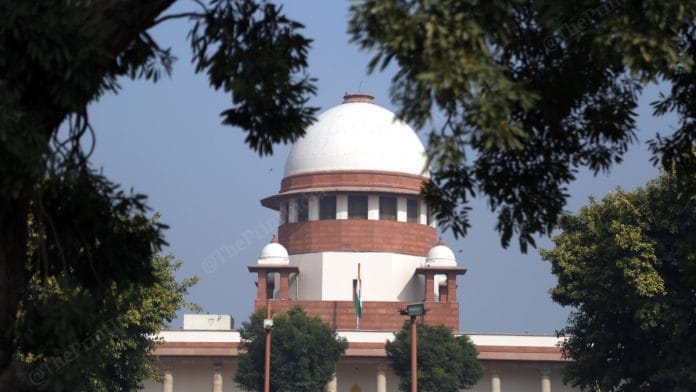New Delhi: A person’s religious identity can be revealed by his/her name and not by the clothes he/she wears, the Supreme Court remarked Friday, while staying the operation of a Mumbai-based private college’s instruction that banned the wearing of the hijab, caps and badges by students of the institution.
A bench of justices Sanjiv Khanna and P.V. Sanjay Kumar was left astonished when told that the ban by N.G. Acharya & D.K. Marathe College, particularly on the wearing of the hijab, was to prevent students from revealing their religion. The hijab, the college argued, is a prominent marker of Muslim identity and could encourage others to wear clothes, such as saffron shawls, identified with a specific religion.
“You don’t want students to reveal their religion; won’t their name reveal their religion?” the bench verbally asked the institution’s counsel, senior advocate Madhavi Divan.
“Will you ask them to be given numbers at the gate, and not address them by their name, so that their religion is not revealed?” the bench further enquired, advising Divan to instruct her client not to impose such a rule. Probing further, the court observed: “Will you say a Hindu wearing a tilak will not be allowed?”
Divan resisted the court’s stay order, arguing such an intervention affects the autonomy of a private educational institution. She justified the ban on wearing the hijab on the grounds that it creates “barriers” to interactions. “Tomorrow, we will have people in saffron shawls. We are not a political playground, not a religious playground,” the counsel told the bench.
In response, the bench wondered whether a dress code stipulation would empower female students. “Should it not be left to a girl to decide what she wants to wear? Where is the question of empowering women by imposing your dress code on them?” Justice Kumar asked. He also expressed his reservations on the arguments advanced by the institution through the senior advocate, and called them unfortunate.
The Supreme Court was hearing an appeal filed by female students of N.G. Acharya & D.K. Marathe College against a 26 June order of the Bombay High Court that dismissed petitions filed by them challenging the institution’s dress code, which prohibited students from wearing the hijab, niqab, burqa, stole, cap etc. on campus
The petitioners, pursuing their second and third-year undergraduate courses, challenged the dress code on the ground that restrictions on the hijab, niqab, burqa, stole, caps etc. on campus violated their fundamental rights.
It may be recalled that the top court is already seized of a similar issue related to a hijab ban at a pre-university educational institution in Karnataka. In October 2022, a division bench of the Supreme Court had delivered a split verdict on the validity of the rule. Referred to a three-judge bench, the matter is yet to be heard at length in the Supreme Court.
Instructions ‘unfortunate’
Justice Khanna’s bench Friday recalled the question of law on whether the hijab is an essential part of Muslims’ religious identity.
The bench, which at the outset indicated its intention to stay the college’s instructions, sought to know what prompted it to prescribe the dress code 16 years after it was established. “You have suddenly woken up to realise there is religion in this country. Till now, everything was fine,” Justice Kumar added.
Divan’s repeated attempts to explain the context in which the instructions, including the hijab ban, were issued failed to convince the bench. She said in the name of the hijab, women were actually dressed in niqabs that covered their faces totally.
“On behalf of the private institutions, we have provided lockers and changing rooms to them in the college and have given them the liberty to keep their hijabs in them,” Divan told the court. As a neutral institution, she added, the college wants a conducive environment for education and interaction. She informed the bench that the college strongly opposed an intervention made by a self-proclaimed Hindu group in the matter when it was pending before the Bombay High Court.
However, the bench remained undeterred and observed: “It is unfortunate that you come up with these kinds of instructions after so many years of independence.”
Divan claimed that the objection to the ban was raised by only three of the 441 girl students and many of them had already left the college. Calling it a “sad move,” the bench hoped they had not gone to a “particular (minority) college”.
Despite the bench’s strong disapproval of the “circular (instructions)” Divan continued to argue. She said as a private institution, her client had complete discretion to decide the college’s “ethos” and pointed out that the instruction also prohibited both male and female students from wearing torn jeans.
Sticking only to the hijab ban, the bench observed: “Let’s assume three of them (women students) want to be distinct (by wearing the hijab); let them be. Maybe they will realise it in some time and leave it.” It hinted at the possibility of women being forced to wear the hijab due to their family background.
“We don’t want to make it a point but to insist that A or B should be coming in this fashion is not a solution (to the problem echoed by the college). The solution to a lot of things is proper good education,” said Justice Khanna, warning the college against asking the students protesting against the hijab ban to leave.
The court addressed Divan’s concern that the stay of the college’s instructions may give rise to political activity in the institution. It stayed the instructions only to the extent that it banned the hijab, caps and badges, and further clarified that the interim order was not to be misused by anybody.
The bench gave liberty to the college to move for vacation of the stay or amendment of its order if there is a violation of the interim order.
(Edited by Rohan Manoj)
Also read: SC expunges ‘contemptuous’ remarks by judge, advises HC judges to exercise ‘greater restraint’






